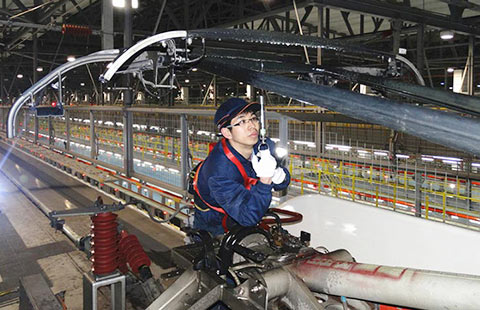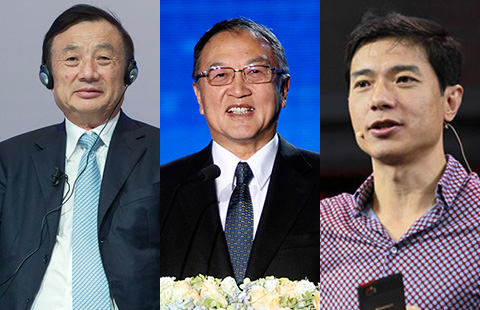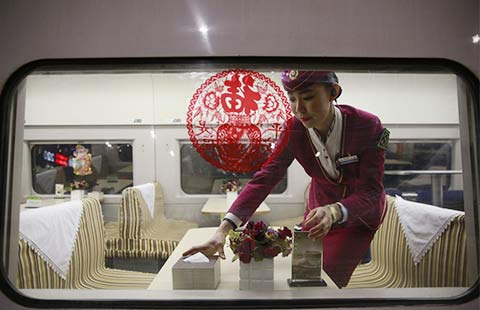Wenzhou's shoe, clothing firms start to step out
By Gao Changxin and Yu Ran (China Daily) Updated: 2012-09-04 09:22

Entrepreneurs in the private business hub are leading a push into overseas markets, Gao Changxin and Yu Ran report from Wenzhou, Zhejiang
As China's large State-owned enterprises pour money into overseas expansion and acquisitions, the country's private businesses have also started setting their sight on the international market.
And entrepreneurs in Wenzhou, a city with a tradition of entrepreneurship, are among the leaders in the international expansion of the country's private sector.
One example is Wenzhou Kangnai Group Co Ltd, one of the leaders in Wenzhou's pillar footwear industry. The company spent 20 years transforming itself from a household workshop into a modern manufacturer that employs more than 5,000 workers. And now it's quickening its pace to expand overseas, vowing to open 1,000 stores abroad over the next five years. Its first overseas store opened in 2006 in Paris.
Kangnai's overseas expansion is not just a case of following others' lead, deputy general manager Zhou Jinmiao said. Going into retail helps achieve higher margins. Previously, Kangnai's overseas sales were mainly wholesale, and the company did not have its own brand.
Zhou said setting up stores overseas helps Kangnai build its own brand and learn market dynamics directly. And the move is a "must" for Kangnai to become an international brand, he said.
Kangnai has entered into a partnership with UK-based SATRA Technology Center, which provides the footwear industry with services in technical knowledge, research and testing.
The move has already had some effect. The average export price of Kangnai shoes now stands at $25 a pair, more than double the industry average in China.
Wenzhou boasts up to 140,000 private companies, accounting for 95 percent of its exports and 94.4 percent of its employment, according to local government data.
The amount of circulating private funds is expected to reach 800 billion yuan ($126 billion) and is growing at an annual average rate of 14 percent.
The number of Zhejiang's overseas firms topped all provinces, municipalities and autonomous regions on the mainland in 2011, accounting for 17.8 percent of the total, according to the Statistical Bulletin of China's Outward Foreign Direct Investment compiled by the Ministry of Commerce.
In fact, the central government is actively encouraging Wenzhou's private sector to invest overseas. The State Council has said it will study allowing residents in Wenzhou to make direct investments overseas as part of a financial reform program.
Chinese mainland residents currently cannot make direct overseas investments. But they can give their money to fund managers, who in turn can invest overseas through the qualified domestic institutional investor arrangement within set limits.
An official in Wenzhou told China Daily earlier that the city has asked that the maximum be set at $200 million a year for each person. A central government endorsement is still pending.
"The move would help businesses in Wenzhou to branch into overseas markets and build stronger ties with foreign companies," said Zheng Chenai, chairman of Wenzhou Fashion Association.
"More importantly, it would give Wenzhou's private sector an opportunity to make overseas acquisitions at a time when the economy in the US and Europe is experiencing difficulties."
Moving the main part of his company from Wenzhou to New York in 2008, Chen Jianhua has successfully introduced his clothing brand, Brave-man, to the US market.
"We used to manufacture suits, ties and other formal clothing in Wenzhou for clients in the US, which made little profit, so I launched the office in New York to be the wholesaler and the manufacturer at the same time," said Chen Jianhua, the founder of Zhejiang Brave-man Dress Co Ltd.
In 2009, Chen opened one store in Chicago and a flagship store in Los Angeles, wholesaling his products as the first step to let the public know the brand.
"I've spent about $30 million expanding the wholesale business in the US so far, and luckily, the annual sales of the two stores keep increasing 30 to 40 percent," Chen said.
He added it is much easier to save costs by manufacturing the products in Wenzhou, labeling the prices of products by himself and selling them in the US directly.
As he expected, the company will be able to make more than $10 million in profit in the US this year.
In order to move his focus to be the manufacturer and wholesale provider, Chen had to shut down the store in Chicago in March and will soon end the direct-selling business in Los Angeles.
"I have got about 200 regular clients in the US by selling my products in their stores. Now my own stores will be the wholesale provider instead of the direct seller," Chen said.
Another pioneering businessman in the footwear industry, Wang Jianping, succeeded by transforming Hazan Shoe Co Ltd from a small footwear factory to a middle-class brand.
Launched in 1991, Hazan used to be a small factory with dozens of workers who made about 300 pair of shoes every day by hand.
"We used to focus on being the original equipment manufacturer for international brands for the first three years, and I decided to bring Hazan as a Chinese brand to Russia as the first step out of China in 1994," said Wang Jianguo, Hazan Shoe chairman.
Becoming the first shoe manufacturer in China involved in global acquisition and marketing, as well as the first transnational enterprise in Wenzhou, Hazan has two modern production lines in the West African nation of Nigeria, making 3,000 pair of shoes each day, and a research center in Italy.
With the support of 2,000 highly skilled employees in China and abroad, the daily output volume of Hazan now exceeds 15,000 pairs. "Our shoes are selling well in more than 50 countries and areas, with an annual sales revenue of $3 million," Wang said.
Hazan spent 20 years transforming a local manufacturer into a global company, which sets an example for other struggling shoe makers. "Although our business has been affected slightly by the financial crisis in the US and Europe, I can quite confidently encourage more Wenzhou businessmen to take their brands abroad," Wang said.
Contact the writers at gaochangxin@chinadaily.com.cn and yuran@chinadaily.com.cn.
- Northeastern China spinning an icy web of money
- Chinese shares close lower - Feb 5
- Mexico, China to implement $2.4b joint investment plan
- Half of young Chinese plan to travel during Spring Festival: survey
- Foreign investment evolves along with China's economy
- Train technicians ensuring safe journey home
- China to inject $107b to upgrade rural power grid
- State Council approves draft regulations of social security fund
















